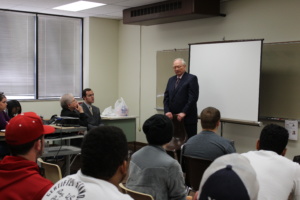 By TAYLOR MORRIS, Student Reporter
By TAYLOR MORRIS, Student Reporter
Last Thursday afternoon, lawyer Stephen Jones made a visit to Northwestern’s campus to speak with mass communication students involved in the OBEA/SPJ club. He spoke of his experience of working in the high profile case that involved him representing the man responsible for the Oklahoma City bombing in 1995 that resulted in the death of 168 people. That man was Timothy McVeigh. “It was a the time the largest mass murder in history.” Jones said.
According to Jones, he thought that McVeigh was a complicated individual, manipulative, and lied to him from the very beginning, however McVeigh wasn’t anything like the media depicted him to be at the time. Oddly enough, McVeigh wanted to plead guilty for what he had done; however he did not want to discuss whom else was involved in the orchestration of the bombing. “He had an emotional desire to be seen as the man that did it.” Jones said.
Jones worked on McVeigh’s case for two and a half years and at the end of McVeigh’s trial he was found guilty and sentenced to death. Jones also addressed his opinions on the freedom of the press and the right to a fair trial. He expressed how difficult it was for him and his defense team to ensure that McVeigh was given a fair trial with the constant media coverage and the press’s insistence to know more about the trial. “ I found there were very few reporters I could trust…the media is both good and bad.” Jones said. Moreover, he felt that the government had a very skillful presentation against McVeigh that was intended to hit the jury emotionally. Near the end of Jones’s discussion students were given the opportunity to ask questions. When one student asked, “ How did you put up a shield to not look at him like ever body else did?” Jones replied that when asked that question through the years his professional answer was usually, “It’s my duty.” However, he went on to explain that although it took him sometime to understand that those that asked the question were looking for an emotional response. It was until later in Jones life that realized something through his experiences of working in a funeral home when he was 19. “It dawned on me that I had really been prepared for the carnage, there’s not other way to describe it. What we saw, the deceased persons and the disruption of their bodies, the bombing, the loss of life, or the children. I had been prepared for that five decades
